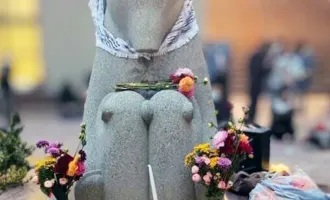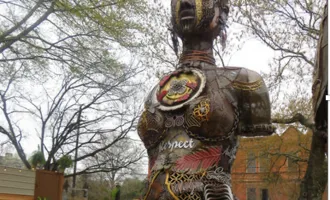
This Date in UCSF History: Empowering Nurses
Originally published in Synapse on March 20, 1974.
Wilma Scott Heide, the first nurse to be elected national president of the National Organization of Women (NOW) told a large and responsive audience at UCSF Monday night that “mass consciousness-raising is needed in nursing.”
The predominantly female audience appeared to agree.
“One of the most important things we need as women and as nurses is power. We can’t afford to be afraid of that concept and that basic need. Our relative powerlessness is the root of many of our problems,” said Heide.
She discussed the ways in which the nursing profession is devalued by society, along with other traditionally female occupations such as library work, social work, teaching and clerical work.
“Nursing represents an extension of what people have done as homemakers in terms of caring for others; and homemaking, which includes childcare, is also devalued,” she said.
Heide cited the rating of “homemaker” at the bottom of a numerical scale of values in a dictionary of occupational titles published by the government.
“Nurturance as not only a private but also a societal value is very low on the scale in this culture,” she stated. “Men express it often in disguised and devious ways. They worry that they’ll be considered unmasculine if they’re too tender and caring.”
The majority of Heide’s remarks were addressed to the situation of women in general rather than specifically referring to nurses.
She described other manifestations of society’s lack of concern with nurturance, such as the Nixon administration’s impoundment of funds which had been appropriated by Congress for childcare facilities.
“This was considered inflationary, but not the defense budget,” she said. “Would men value life more than some appear to now if they were involved in child care? How many times have decisions been made to use organized war as policy just to provide somebody’s manhood?”
Heide said that the creation of the National Women’s Political Caucus has given women an opportunity for the first time in history to be significantly involved in the political process.
“A white male club is simply not a democracy. This country has to decide if it’s a white patriarchy and stop pretending to itself and the world — or make some basic changes,” she stated.
“The Watergate phenomenon,” Heide continued, “was absolutely predictable: the tip of the iceberg of the white masculine mystique, which is to win at any price.”
In discussing changes in health care delivery which feminism has brought about, she said that the self-help movement in gynecological health care is “revolutionary.”
She spoke of the importance to women of the right to abortion and looked forward to a time when “the discussion and deliberation of legislators, religionists and physicians, except as technicians, will become obsolete. We have to care enough about our children to see that they have a right to be wanted.”
Heide emphasized the negative effect which women’s exclusion from the English language has had on their self-image.
The use of male nouns and pronouns to refer to both men and women (“man and his environment”) is commonly accepted, she said, and “people tell us we’re nitpicking when we suggest the English language is “Manglish.”
However, she remarked, the reaction would be very different if female nouns and pronouns were used instead of male ones in cases where a neutral gender is intended.
Heide suggested that the audience try doing this for a few days to gain an understanding of how unnatural the currently accepted semantic practice really is.
Another example of sexist language is illustrated by the use of the term “women’s lib” to refer to the women’s movement, she said.
“‘Lib’ is a flip way of referring to a serious movement. It has the effect of trivializing it.”
In a press conference earlier in the day, Heide spoke of the political changes she hopes will occur in NOW.
“There’s no doubt in my mind which way we must go. We must become more radical, in the sense of getting at the root causes of problems. To be serious about anything you must be radical.”
She said that as the largest occupational group in health care, nurses “will be a resource and a catalyst for change. Feminism, in terms of values, behavior, goals, and commitment, has so much to offer nursing and the health care field. I support feminists who say girls should be encouraged to be physicians — but I feel that both girls and boys should be encouraged to be physicians and nurses.”
“We need to change our values from androcentric — male-centered and dominated, to androgynous — a balance of female and male,” Heide continued. “I would like to see nursing as the vanguard of that behavioral revolution.”



